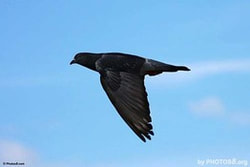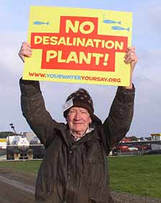 "That tiny speck in the sky, growing ever larger ... " Photos8.org
"That tiny speck in the sky, growing ever larger ... " Photos8.org RECEIVED a Christmas card right on the deadline, one that is too late to respond to. It was one of those supporting a worthy cause. The type of card we should all send, if we send cards at all.
This one was printed for the International Fund for Animal Welfare.
The back of the card tells me: “IFAW was founded in 1969 to save animals in crisis around the world. We protect cats and dogs from cruelty and neglect and we rescue animals in the wake of disasters. We work to protect elephants, tigers, and other animals from poaching and wildlife trade.”
Well, it triggered off memories that haunt me all too often.
Years back I got hooked on the fancy of racing pigeons. Of all the sports and hobbies that I had been involved in, this was the one that gave me the greatest pleasure. The breeding, feeding, training and general loft management of the birds consumed all my spare time. The bonus was the anticipation on race day. Waiting and waiting for one of your birds to arrive home.
That tiny speck in the sky, growing ever larger, home in sight, wings folding to streamline the descent, gliding unerringly through the backyard trees to make an exhausted landing. Yet still finding time to preen buffeted feathers before entering through the bob wires to the sanctuary of the loft.
The final race of the season is the long distance classic, the Melbourne Cup of the pigeon calendar. This particular year the release point was Bookaloo, South Australia, 77 kilometres north of Port Augusta and 965 kilometres from Melbourne as the crow flies, which pigeons don’t do.
The race birds were let go on the Thursday with an expectation of returning to their lofts by Saturday or maybe Sunday.
I clocked in a bird early on the Sunday morning and his time was good enough to be first in the club and 18th in the federation, that's all the combined Melbourne clubs. I was feeling pretty chuffed with myself.
The following year I travelled for the first time through Bookaloo on a camping trip to the Territory. There is nothing there, just semi-desert, stunted scrub, what appeared to be an electrical sub-station and lots of loneliness.
I looked back on the vast distance we had travelled from Melbourne. How can a 450-gram non-migratory bird, just following an inherent homing instinct, travel this journey? Flying over the unfamiliar territory of mountain ranges, valleys and wide open plains. Selecting, as darkness falls, a safe place to rest. Then, come morning, continuing its way home to find its backyard among the thousands of lookalikes.
More’s the wonder, why would anyone subject them to such an unnatural task?
More than 2000 birds would have been released that day. I doubt if 10 per cent made it back.
It dawned on me that this was a form of unintentional cruelty.
That was the last time I raced pigeons.
******************
My mate Frank, a wool grower up in the Seymour district, keeps a pack of working dogs, usually ranging from a pup in training to an old dog still working the paddocks and yards. As they slow down with age and arthritis, he retires the old warriors to become house pets in their twilight years. Every one in the group moves up a step.
By contrast his neighbour, a very successful and astute grazier, goes and gets samples of all the different brands of dry dog food. The brand the dogs show the least liking for and thus eat less of becomes their daily meal. When their useful working life ends, they are shot.
Cruelty without intent or practical economics?
I look at the fat lambs in Frank's paddock and the beef cattle over the fence and wrestle with the contradictions of my own values.
I am not a vegetarian.

 RSS Feed
RSS Feed